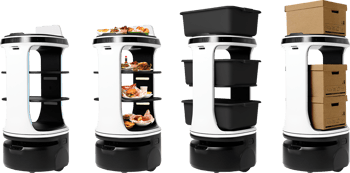When the pandemic hit, like many in the restaurant industry, Kellie Terry was forced out of work. The mom-and-pop restaurant where she’d been hired as a general manager went out of business. Terry had recently relocated to Jacksonville, Florida for the job, a move that depleted her savings. Then not long after, she got hit with a pulmonary embolism, impacting her lungs. Suddenly, Terry says she was sped into the “darkest spot” of her life.
“The doctor said, ‘If you catch COVID, we can guarantee you're not going to make it, and I really need you to stay home’,” says Terry. “At that time, my son was 12 [years old], I don’t receive child support, and unemployment in Florida was backed up by seven months.”
Terry quickly found herself nearing eviction. Unsure of what to do, she turned to a friend who suggested reaching out to a local congressman. Terry rang up the office, shared her situation, and moments later, she was referred to Southern Smoke Foundation, a nonprofit with an emergency relief fund for those in the food and beverage industry.
Within 10 days of emailing the organization, Terry was awarded more than $3,000, enough to pay for four months of rent, catch up on bills, and set Terry up for an overall better position for when it was safer to pursue a new job.
“My stuff was packed at my house – that’s how close to the edge I was running at that point,” says Terry, who has since taken a job at Wendy’s, currently serving as an acting district manager. “I wouldn’t be able to get to and from my current job had they not helped me get my car fixed, helped me stay in my home. I would’ve been in a shelter with my son.”
‘Taking care of folks in the industry in their time of crisis’
Founded in 2015, the Southern Smoke Foundation, often referred to as Southern Smoke, has served as a safety net for years, distributing more than $10 million directly to people in the food and beverage industry.
“Our goal has remained the same from the beginning – taking care of folks in the industry in their time of crisis,” says Southern Smoke founder and Houston-based restaurateur Chris Shepherd.
It’s one of the few organizations of its kind that distributes money directly to grant recipients’ bank accounts. The average award is $2,500, which most often goes towards covering rent and utility bills, medical expenses, and groceries, but also financial situations like the cost of car repossessions or damages related to natural disasters. In the rare case, Southern Smoke will take control of grants and pay an individual’s bills directly.
“These are circumstances with larger sums of money, so right now, for instance, we’re covering rent for a year for a family of nine,” says executive director Kathryn Lott. “For one year, we’ll pay their rent directly, and refer them to programs to help them get out of the cycle of homelessness and keep their kids safe.”
No ask is too big or too small, says Shepherd, noting the foundation has awarded amounts ranging from $100 to $100,000. Grant sizes are determined on a case-by-case basis. The goal is to help as many people as possible.
“We started the emergency relief fund because we were worried about people not living paycheck to paycheck but living shift to shift,” says Lott. “We deal a lot with multigenerational homes, and if someone misses a shift, it could mean their elderly parents don’t have access to their medications, or their kids don’t get the shoes they need to go to school. We see landlords take advantage when people are really down, especially if English isn't their first language, and we want to make sure that families who are in a vulnerable spot don’t end up in more danger.”
Applying for emergency relief funding
From farmers to fisherman, fry cooks to servers, QSR cashiers to brewers, and beyond, anyone employed in the food and beverage sector can apply, as long as you’ve been employed for a minimum of six months and average 30 hours per week across one or multiple industry jobs.
“It can be for any unforeseen expense caused by crisis – that’s it,” says Lott.
Applicants must provide a statement of need, employment history, copies of current and previous pay stubs, and, if applicable, a lease or mortgage statement and utility bill copies. Once the application is submitted, individuals are immediately assigned to a case manager.
“Their job is to build the strongest case possible in order to get you up and out of crisis,” says Lott. “They put together your financial statements and build your narrative, and that eventually goes to me, I give my recommendations, and then it goes to an awards committee, and ultimately they vote as to who gets what.”
The award committee looks at the overall financial need and the current debt of each applicant. Votes happen once a week, and money is sent out twice a week, unless there’s a “code red” scenario where someone is experiencing a life or death situation.
“We look at if there’s a vulnerable population in the household, if there’s a child, someone who’s elderly, transgender, or who has a disability – all those different populations that would make it harder for them to survive in a shelter,” says Lott. “First and foremost, we want to make sure those folks take precedence.”
Terry described the process as quick, but also supportive. There have been times where she’s called her case manager in moments of frustration, simply just to talk.
“The financial [support] was amazing but it was also knowing somebody cared and was listening and willing to help,” says Terry.
Mental health services
In recent years, Southern Smoke has begun to expand its services to include mental health support.
“There had been the passing of Anthony Bourdain, and we started looking at, how do we change the industry? What impact can we really make?” says Shepherd. “We had a closed door session with a bunch of chefs coming to our [annual Southern Smoke] festival from out of town, and we came to the consensus that it was the mental health aspect of things.”
In 2020, Southern Smoke partnered with Mental Health America of Greater Houston and the University of Houston to provide free mental health care to Texas-based food and beverage workers and their families. The program has since expanded to Louisiana, California, and Illinois, along with a pilot program in Pennsylvania, with the goal to add eight more states to that list annually.
In each state, Southern Smoke grants partner universities funds that allow for supervised graduate-level clinicians to offer telehealth counseling services. Members of the industry can sign up online.
“Our program manager walks you through a test vetted by people in the mental health world,” says Lott. “It’s on a 1-to-10 scale – if you're at a 10 and need to go to the hospital, she’ll make all of the arrangements to get you to the emergency room. Otherwise, she works with the administrator at the university partner to assign you a grad student.”
Donations by the millions
As many in the industry are now advocating, Lott and Shepherd want to see conversations about mental health become normalized. Southern Smoke is currently raising funds to bring free mental health services to all 50 states.
“I am so grateful for every single penny that comes in. But for every penny, we need a dime,” says Shepherd. “We’re not here just to do this. We’re here to make an impact, and we’re not even close to where we need to be.”
Everyone from David Chang to the Emeril Lagasse Foundation has backed the fully donation based organization. At the onset of the pandemic, Southern Smoke also formed a partnership with the Restaurant Workers Community Foundation, which continues to contribute funding. But the organization’s flagship fundraiser is its annual Southern Smoke Festival, which brings together chefs from all across the country to Houston. This year’s festival raised $1.6 million.
“It’s not just a food festival,” says Shepherd. “It’s a PR festival to market what we’re doing, so our friends can go back to Boston and tell their team, there’s someone that’s here to take care of you.”
Grace Dickinson is a reporter at Back of House. Send tips or inquiries to grace@backofhouse.io.
[Photo courtesy Catchlight Photography]





